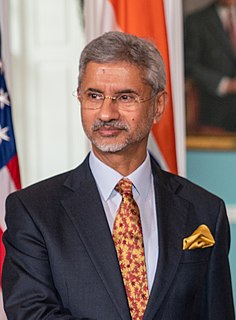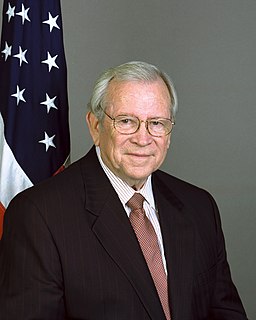A Quote by Colin Powell
When you decide to get involved in a military operation in a place like Syria, you've got to be prepared, as we learned from Iraq and Afghanistan, to become the government, and I'm not sure any country, either the United States or I don't hear of anyone else, who's willing to take on that responsibility.
Related Quotes
Iraq at one time was actually a functioning government. It's a real state. Afghanistan is not Iraq. It's tribal. It's got a different - a number of different sects, never really had a solid government there running the country on any kind of a continuing basis. Well, to rebuild the nation of Afghanistan is going to be more difficult than rebuilding the nation of Iraq.
We have a strong military deployment in Iraq and Afghanistan. In countries like Syria, we need a diplomatic breakthrough to end the war. In Libya, the country must first of all be stabilized to stop IS. This means supporting the Libyan government, including in terms of security. We don't want to repeat the mistakes of the past in that country. The situation is extremely dangerous and the next days could be decisive.
Being an American journalist can put people on the defensive. In countries where people assume the press is partisan, like in Lebanon, or where it had essentially become an extension of the government, like in Iraq, people tend to see a journalist as an agent of his or her government. That can be dangerous if the United States military is occupying their country, or aligned with their enemies.
Continuous wars - which we have now had since 2001 - starting with Afghanistan, continuing on to Iraq. And even since Iraq, it's been more or less continuous. The appalling war in Libya, which has wrecked that country and wrecked that part of the world, and which isn't over by any means. The indirect Western intervention in Syria, which has created new monsters. These are policies, which if carried out by any individual government, would be considered extremist. Now, they're being carried out collectively by the United States, backed by some of the countries of the European Union.
Currently, the United States has troops in dozens of countries and is actively fighting in Iraq, Syria, Libya, and Yemen (with the occasional drone strike in Pakistan). In addition, the United States is pledged to defend 28 countries in NATO. It is unwise to expand the monetary and military obligations of the United States given the burden of our $20 trillion debt.
I just have to tell you that the provocations by Russia need to be met with American strength. And if Russia chooses to be involved and continue, I should say, to be involved in this barbaric attack on civilians in Aleppo, the United States of America should be prepared to use military force to strike military targets of the Assad regime to prevent them from this humanitarian crisis that is taking place in Aleppo.
At no time in the past, now or in the future has or will Russia take any part in actions aimed at overthrowing the legitimate government. I'm talking about something else right now - when someone does this, the outcome is very negative. Libya's state is disintegrated, Iraq's territory is flooded with terrorists, it looks like the scenario will be the same for Syria, and you know what the situation is in Afghanistan.
Our process inside the United States government has gotten much better at making sure we touch all possible source of information about a refugee. The interview process has gotten more robust, so we've gotten our act together in that respect. The challenge remains, especially with respect to folks coming from Syria, we're unlikely to have anything in our holdings. That is, with people coming from Iraq, the United States government was there for a very long period of time. We had biometrics, we had source information. We're unlikely to have that kind of picture about someone coming from Syria.











































